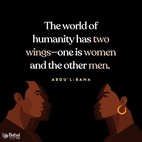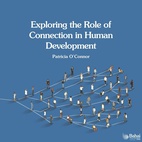The views expressed in our content reflect individual perspectives and do not represent the authoritative views of the Baha'i Faith.
The Baha’i teachings say that we now live in the Promised Day – that a promised kingdom has come, but in nascent form because our awareness of it is just beginning to dawn.
Of course, awareness can and does change. Until it does, however, we will not see the coming light in all its brightness. Rather, we will see darkness wrought by those who have rejected right action — for them and for those trapped by them, hell has been made to blaze. In the future, we will see more darkness coming as the actions of those who disregard the divine call, who harm others, and who harm the earth continue to ensnare us.
Indeed, as the Baha’i writings affirm, “The time foreordained unto the peoples and kindreds of the earth is now come” and “… the promises of God, as recorded in the holy Scriptures, have all been fulfilled.”
Baha’u’llah, the prophet and founder of the Baha’i Faith, wrote:
The world is in travail, and its agitation waxeth day by day. Its face is turned towards waywardness and unbelief. Such shall be its plight, that to disclose it now would not be meet and seemly. Its perversity will long continue.
The teachings of all the great Faiths have warned us for millennia that the arrival of the Promised Day would bring both heaven and hell. That day promises us light and a way forward — as well as darkness, which calls for judgment and justice when we disregard that light or cast it aside.
RELATED: How a Divine Plan Moves the World
The Greater Plan
Consider what happens when God intervenes in history. When the Creator of the universe acts, a collaborative process begins – a divine messenger appears, imparts spiritual guidance to humanity, and a mystical process of change ensues, affecting everyone. The old reality is supplanted by a new reality, although we may be slow to recognize it.
Baha’is believe that the origin of the change we’re now seeing in the world began with the advent of Baha’u’llah during the middle of the 19th century. Today, the world is currently responding to the renewal of God’s ancient plan, which, just as it has done many times before, works to eradicate deficient systems and create a renewed bond of unity among humankind.
What has changed is that we are no longer being judged by our allegiance to past creeds, but our response to a new creation. The essential feature of this new creation involves bringing us together — solidifying our human oneness. It is nowhere complete, because it is a process, and it has physical, psychological, and social dimensions that unfold at different rates. There is, however, no doubt that we are well into a long-heralded age. We have been assembled together; we stand equally before God; and we are being judged on our willingness to act unitedly, to cast away the things that divide us, and to acknowledge the divine plan.
The sun takes some time to dawn, and even after it rises many remain asleep. Perhaps that explains why most of humanity remains unconscious of the arrival of the Promised Day even after its advent. Instead, they search for what is lost, seeking principles to guide us. In that search, people have come up with a whole host of various ideas – so let’s examine a few of them.
Pure Liberty and Freedom
Many in the global West advocate freedom as the fundamental good, to be advanced at all costs – but unrestrained freedom is clearly a bad idea.
We have laws, moral codes, and social injunctions for good reason. We need the lines on streets and stop signs and lights at intersections and many other social restraints as well. Society does not function well when people are completely free to do whatever they want. When investment bankers are free to make short-term profits by making shaky long-term loans and transferring the risk to others, millions of people suffer because of the greed of a few. When capital holders are free to manipulate markets for their own gain while leaving others to absorb the costs, their freedom hurts society. When a few capitalists are allowed to gain control over most of the world’s labor and resources, their freedom to do so is gained at the cost of the freedom of others. Clearly, society requires some restraints on absolute personal freedom to uplift and protect humanity. Baha’u’llah wrote:
That which beseemeth man is submission unto such restraints as will protect him from his own ignorance, and guard him against the harm of the mischief-maker. Liberty causeth man to overstep the bounds of propriety, and to infringe on the dignity of his station.
The West has also proposed capitalism and free markets as a supreme remedy. If capitalism is the right of individuals to buy and sell assets in a free market, history has shown that this is often conducive to collective prosperity. But if capitalism is only about maximizing profits for owners, with no concern for society, social order and the quality of life are compromised. Capitalism, by itself, is not a moral force. Because of those limitations, the capitalism many countries now practice leads to growing inequality as capital is used to bend laws to accommodate the desires of capital owners, and so-called “free markets” are hardly free when people of means manipulate them through media and legislation, and when they buy out competitors to avoid competition or force competitors out of business by artificial pricing strategies. In this brand of unrestrained, laissez-faire capitalism, the rich and powerful come very quickly to dominate all others.
There are, of course, a few saints in capitalist societies who have used their great wealth to improve the lives of the poor and needy, but it is not capitalism that motivates their actions; it’s their moral attachment to humanity and to the code of responsibility taught in all the great Faiths. One wonders, however, who much wealth individuals should be able to amass, and how much they should give back to society—from which their wealth comes.
Democracy has also been proposed as the sovereign remedy for our ills. Democracy has the advantage of being responsive to the voting public, but the public can be misled and manipulated, and democratically-elected leaders can make monumental mistakes. Plenty of tyrants have been democratically elected – when Hindenburg, President of Germany, appointed the runner-up in the presidential election of 1932, Adolf Hitler, as Chancellor, he made a huge mistake. Democracy can also be brutal, playing to the misconceptions and prejudices of the public.
RELATED: We Live in Revolutionary Times—Why?
The East has proposed communism to bind society together, but without a belief in the hallowed nature of humanity and people’s rights to self-direct, own property, and benefit from their own efforts, an insufferable malaise often sets in, and corruption infects those with power. While people need to be protected from exploitation by capital owners, state ownership of production is no guarantee of prosperity and can lead to misery and stagnation just as easily as capitalism. Communism does, however, give rise to the idea, now often applied in the West, that production and happiness can be increased when workers earn shares of the corporation that employs them. The Baha’i teachings affirm this practice, as Abdu’l-Baha pointed out in Some Answered Questions:
It is preferable, then, that some measure of moderation be achieved, and by moderation is meant the enactment of such laws and regulations as would prevent the unwarranted concentration of wealth in the hands of the few and satisfy the essential needs of the many. For instance, the factory owners reap a fortune every day, but the wage the poor workers are paid cannot even meet their daily needs: This is most unfair, and assuredly no just man can accept it. Therefore, laws and regulations should be enacted which would grant the workers both a daily wage and a share in a fourth or fifth of the profits of the factory in accordance with its means, or which would have the workers equitably share in some other way in the profits with the owners. For the capital and the management come from the latter and the toil and labour from the former. The workers could either be granted a wage that adequately meets their daily needs, as well as a right to a share in the revenues of the factory when they are injured, incapacitated, or unable to work, or else a wage could be set that allows the workers to both satisfy their daily needs and save a little for times of weakness and incapacity.
Governing with scientific principles has also been proposed as the remedy for our times. We live in a scientific age, and it has given us technological advances that have become immensely popular in most parts of the world. At heart, science is engaged in a fundamentally spiritual pursuit — the attempt to discover God’s hidden laws.
But science is not religion. It’s an intellectual, often blind, mechanical method that can provide data and useful findings. Those findings are rarely complete or final, are always in need of interpreting and re-interpreting, and are often controversial. The factual evidence science unearths is certainly better than the silly nonsense that some religious people who ignore science often put forward to explain physical reality – but science does have its limits. Scientific findings without any moral structure or boundaries can be used for terrible ends.
Science requires wise and seasoned human hearts, best provided by those who value the unity of humanity, who understand our sacred nature, and who know that the Earth’s natural systems must be protected. Those kinds of spiritually-centered decisions allow us to know when, where, and how to best apply the findings and discoveries of science. Indeed, the misapplication of science and technology — whether motivated by the desire for quick profits or ignorance of the effects — has done and can do tremendous harm. As the technology that science provides can destroy nature, we need protections to safeguard the world’s natural systems. Science must be guided by moral, spiritual, and religious values. The Baha’i teachings, which consider the harmony of science and religion as a primary spiritual principle, are designed to help the world accomplish that crucial balance between the mind and the soul.

















Comments
Sign in or create an account
Continue with Googleor